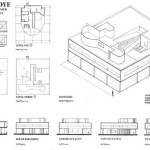Essential Aspects of House Extension Planning Permission Rules
Planning permission is a vital aspect of any house extension project, ensuring that your plans comply with the regulations and don't negatively impact the surrounding area. Understanding the key rules and requirements involved is crucial for a successful project. Here's a comprehensive guide to essential elements of house extension planning permission rules:
Permitted Development Rights
In many cases, you may not require planning permission for certain types of extensions. These fall under "permitted development rights" and include projects like single-story rear extensions up to 4m in depth for detached houses and 3m for semi-detached houses. It's essential to check with your local authority if your extension qualifies for permitted development rights to avoid any potential complications.
Submitting a Planning Application
If your extension requires planning permission, you must submit an application to your local planning authority. The application should include detailed plans, elevations, and a site location plan outlining your proposed extension. It's advisable to consult with an architect or planning consultant to ensure your plans are compliant with the relevant regulations and presented professionally.
Consultation and Notice
Before making a decision on your planning application, the local authority will consult with neighbors and other interested parties. They will also display a notice on your property, informing the public of your proposal. This provides an opportunity for objections or comments to be raised. It's essential to address any objections promptly and consider making compromises where possible.
Material Considerations
When assessing your planning application, the local authority will consider several "material considerations." These include the impact of the extension on the character and appearance of the area, traffic and parking arrangements, and the privacy and amenity of neighbors. The authority must balance these considerations against the benefits of the extension.
Planning Conditions
If planning permission is granted, it may come with certain conditions. These conditions can range from limitations on the height or size of the extension to requirements for landscaping or specific materials. It's crucial to carefully review and adhere to all planning conditions to avoid enforcement action.
Enforcement
If you proceed with an extension without planning permission or fail to comply with planning conditions, the local authority has the power to take enforcement action. This could involve serving an enforcement notice requiring you to cease work or make alterations to the extension. It's essential to always comply with planning regulations to avoid potential penalties and legal complications.
Seeking Professional Advice
Navigating the house extension planning permission process can be complex. It's highly recommended to seek professional advice from an architect, planning consultant, or surveyor who can guide you through the process, ensure your plans meet the necessary standards, and increase the chances of a successful application.

Do You Need Planning Permission For An Extension 2024

Do You Need Planning Permission For An Extension 2024

The 45 Degree Code What It Means For You Lapworth Architects

First Floor Two Y Extensions Do I Need Planning Permission

Homeowners Allowed To Do House Extensions Without Planning Permission Under New Rules Daily Mail

Built Form

Do You Need Planning Permission For An Extension 2024

All You Need To Know About House Extensions In 2024

House Extension Without Planning Permission What Are The Rules Resi

House Extension Single Y Do You Need Planning Permission Permitted Development








